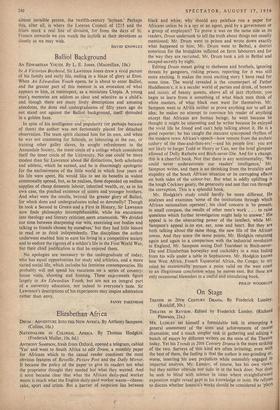Balliol Background
AN EDWARDIAN Yount, By L. E. Jones. (Macmillan, 18s.) IN A Victorian Boyhood, Sir Lawrence Jones drew a vivid picture of his family and early life, ending in a blaze of glory at Eton. When An Edwardian Youth opens, he is about to enter Balliol, and the greater part of this memoir is an evocation of what appears to him, in restrospect, as a miniature Utopia. A young man'§ memories are seldom as clear and selective as a child's, and though there are many lively descriptions and amusing anecdotes, the dons and undergraduates of fifty years ago do not stand out against the Balliol background, itself shrouded in a golden haze.
In spite of his intelligence and popularity (or perhaps because of them) the author was not fortunately placed for detached observation. The team spirit claimed him for its own, and when he was not cramming for Schools, or labouring at the oar, or training other galley slaves, he sought refreshment in the Annandale Society, the inner circle of a college which considered itself the inner circle of the University. No one could be more modest than Sir Lawrence about the distinctions, both scholastic and athletic, which he earned, and he is disarmingly apologetic for the exclusiveness of the little world in which four years of his life were spent. He would like to see its benefits in widest commonalty spread, but, as he realises, these depended on endless supplies of cheap domestic labour, inherited wealth, or, as in his own case, the pinched existence of sisters and younger brothers. And what were the results, beyond the greater glory of Balliol, for which dons and undergraduates toiled so devotedly? Though he took a Second in Greats and a First in History, Sir Lawrence now finds philosophy incomprehensible, while his excursions into theology and literary criticism seem amateurish. 'We divided our time between sharpening our wits, exercising our bodies and talking to friends chosen by ourselves,' but they had little leisure to read or to think independently. The disciplines the author underwent enabled him to earn his living in a competitive society and to endure the rigours of a soldier's life in the First World War, but their chief justification is that he enjoyed them.
No apologies are necessary to the undergraduate of today, who has equal opportunities for study and athletics, and a more varied social life, which includes his feminine contemporaries. He probably will not spend his vacations on a series of country- house visits, shooting and hunting. These enjoyments figure largely in An Edwardian Youth, but are not an integral part of a university education, nor indeed to everyone's taste. Sir Lawrence's descriptions of his experiences may inspire admiration rather than envy.
PANSY PAKENHAM


































 Previous page
Previous page